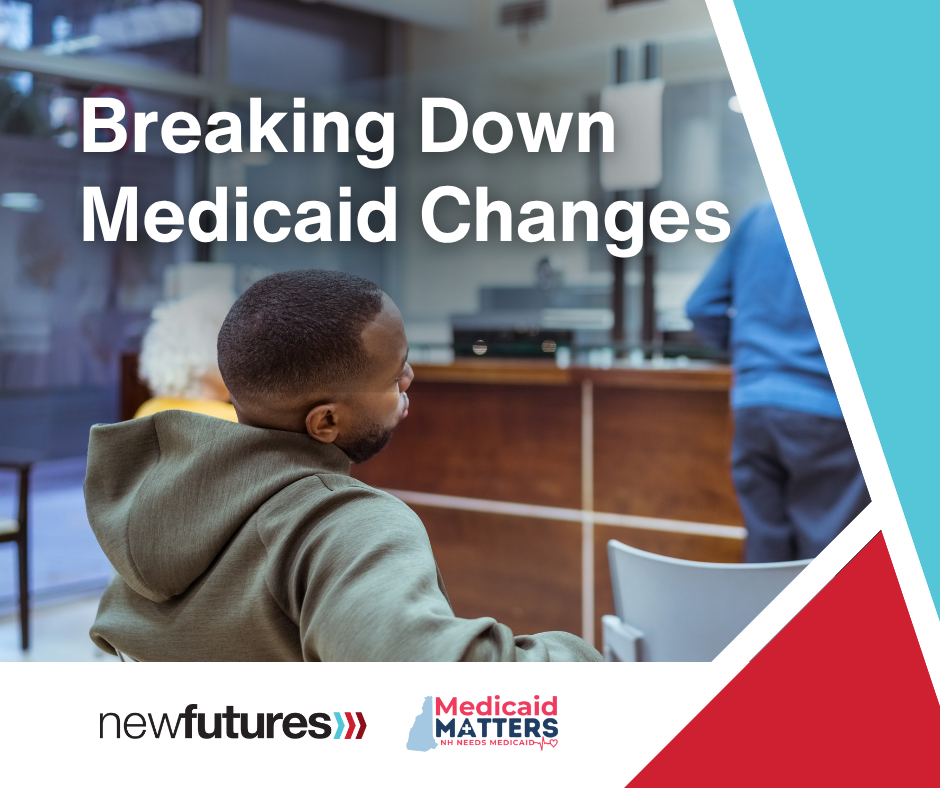Breaking Down the Medicaid Changes in H.R. 1 (the One Big Beautiful Bill Act)

On July 4, President Trump signed into law H.R. 1 (known as the One Big Beautiful Bill Act), which will cut federal Medicaid spending by nearly $1 trillion over the next 10 years, increase the number of uninsured Americans by at least 11.8 million, and reshape Medicaid programs nationwide. In New Hampshire, Medicaid provides health insurance coverage to over 187,000 of our residents—including children, pregnant women, people with disabilities, veterans, and older adults in nursing homes. Children represent the largest enrollment group, accounting for nearly half of all Medicaid recipients.
H.R. 1 requires states to enact work requirements and more frequent redeterminations for Medicaid recipients, as well as reductions in state provider taxes, and other harmful provisions. These federal changes come at the same time that New Hampshire has passed state-level Medicaid changes in its 2026-27 State Budget, including work requirements, premiums, and increased pharmacy co-pays for some recipients. Together, these policy changes will impact thousands of Granite State individuals and families currently enrolled in Medicaid expansion, CHIP (Children's Health Insurance Program), and other Medicaid programs.
"New Futures is alarmed by the cuts and changes to Medicaid included in H.R. 1 that was recently passed into law. The changes will not only put financial strains on working families in New Hampshire, but will leave many without necessary health care,” said Michele Merritt, President of New Futures. “These harmful cuts come at a time when Granite Staters are already rationing prescription drugs or foregoing health care altogether due to rising costs. We further emphasize that these measures will harm families, children, working individuals, veterans, people with disabilities, pregnant women, and others who depend on Medicaid for their basic health care. The stakes could not be higher."
While changes to Medicaid are coming, your coverage remains the same for now. The changes have not yet taken effect but will be implemented on specific dates in the coming months and years.

Key Changes Coming to New Hampshire Medicaid
Federal Changes - H.R. 1 (One Big Beautiful Bill Act)
Medicaid Work Requirements
Both the State Budget and the federal H.R. 1 legislation include burdensome work requirements for Medicaid recipients, creating unnecessary barriers to health insurance and putting thousands of low-wage Granite Staters at risk of losing their coverage. New Hampshire still needs to receive permission from the federal government for the requirements and exemptions, so work requirements will not go into effect immediately.
Effective Date: The U.S. Department of Health and Human Services must publish official guidelines by June 1, 2026. All states must establish their requirements beginning January 1, 2027 (there is an exception in certain cases).
More Frequent Eligibility Redeterminations
Under current law, Medicaid enrollees must renew their eligibility and prove they still qualify for the program once a year. Starting at the end of 2026, adults who are enrolled in the Granite Advantage Health Care Program (or Medicaid expansion) will need to do these eligibility checks and paperwork every six months. This increased frequency creates more opportunities for eligible Granite State adults to lose coverage due to paperwork errors or missed deadlines, potentially leaving them without health insurance despite still qualifying for the program.
Effective Date: January 1, 2027
Reduced Retroactive Coverage
Currently, when you apply for Medicaid, it can help pay for medical bills you had up to 90 days before you applied. Starting in 2027, this will be reduced to just one month for adults enrolled in the Granite Advantage Health Care Program (Medicaid expansion), and two months for people in traditional Medicaid programs. This change will leave Granite State families facing increased medical debt and create additional financial hardship for those who were already struggling to access care.
Effective Date: January 1, 2027
Provider Tax Reductions
Provider taxes are a tax that health care providers pay to help fund Medicaid. These taxes will be lowered incrementally from 6% to 3.5% by 2032, significantly cutting state funding for Medicaid programs. While this may benefit some providers, it creates a funding crisis for New Hampshire's Medicaid system by removing millions of dollars in revenue. This reduction threatens the sustainability of the program and could force cuts to provider reimbursement rates, reduce available services, or shift more costs to enrollees – ultimately making health care less accessible in New Hampshire.
Effective Date: Immediately, the updated criteria for generally redistributive provider taxes went into effect (on July 4, 2025). Starting October 1, 2027, the provider tax thresholds will freeze for two years, and then reduce 0.5% each year until 2032.
Medicaid Expansion Cost-Sharing Requirements
New Hampshire will be required to impose cost-sharing on certain services for adults enrolled in the Granite Advantage Health Care Program (Medicaid expansion) who have incomes above 100% of the federal poverty limit (FPL). For a single individual, 100% of FPL is $15,650 annually or $1,304.17 monthly. New Hampshire must set these costs above $0 but no more than $35 per service, and families cannot be charged more than 5% of their total household income per year. Certain services will be exempted and remain free, such as primary care visits, prenatal care, pediatric care, emergency room care (except for non-emergency visits to the ER), mental health and substance use disorder services, and services to certain community health centers. These cost-sharing requirements will provide additional financial strain for Granite Staters already struggling to get by.
Effective Date: October 1, 2028
Nursing Home Staffing Requirements Delayed
In 2024, new federal rules were created requiring nursing homes to have minimum staffing levels to ensure better care for residents. These rules required nursing homes to have a registered nurse (RN) working on-site at all times, provide at least 3.48 hours of nursing care per resident each day, report how much of their Medicaid funding goes toward paying staff, and receive funding to help train new nursing home workers.
However, these staffing requirements will now be delayed until October 1, 2034. This means nursing homes will not be required to meet these minimum staffing levels for another decade, potentially affecting the quality of care available to residents during this time.
Effective Date: On July 4, 2025, the law was passed which delays the nursing home staffing requirements until October 1, 2034.
Medicare Savings Program (MSP) Simplified Application Delayed
Medicare Savings Programs (MSPs) are Medicaid programs that pay for uncovered Medicare costs for low-income older adults. Existing requirements designed to streamline and simplify the application process for MSPs will now be delayed until October 1, 2034. This means improvements that would make it easier for people to apply for this financial assistance will not take effect for another decade, keeping the current more complicated application process in place and potentially making it harder for eligible New Hampshire residents to access this support.
Effective Date: On July 4, 2025, the law was passed which delays the MSP simplified application process until October 1, 2034.
Home Equity Limits for Long-Term Care
When people with limited income need long-term care, such as nursing home or home-based care, Medicaid can help cover these expensive costs. However, homeowners may not qualify for this assistance if their home is worth more than a certain amount. Currently, each state decides this home value limit and increases it each year as home values increase.
Starting January 1, 2028, the federal government will freeze the home equity limit at $1 million nationwide, with no adjustments for inflation or rising home prices. Some exceptions may apply, but this creates a new barrier for individuals who own homes but still need long-term care assistance, potentially disqualifying more homeowners from receiving Medicaid.
Effective Date: January 1, 2028
Medicare Coverage Changes for Certain Immigrants
Medicare is the federal health insurance program that primarily covers Americans age 65 and older, as well as younger people with certain disabilities. People who are legally in the United States under Temporary Protected Status, as well as refugees and asylum seekers, will no longer be eligible to receive Medicare. The legislation is applied retroactively so current beneficiaries will lose existing coverage. This legislation could leave thousands of older adults and people with disabilities without affordable health care options.
Effective Date: People who are already receiving Medicare benefits but become ineligible under these changes will lose their coverage within 18 months of July 4, 2025.
State Changes - New Hampshire 2026-27 State Budget
Medicaid Premiums and Pharmacy Co-Pays
Along with the federal changes to Medicaid, New Hampshire's State Legislature also implemented changes to the program in the 2026-27 State Budget. The final state budget shifts more costs to Medicaid enrollees and families by implementing premiums and increasing pharmacy co-pays for some families and individuals covered by Medicaid expansion and the Children's Health Insurance Program (CHIP).
For a family of three making $68,000 per year, the monthly premium will be $230 each month, with $4 co-pays per prescription. These provisions create additional financial burdens and barriers to care that may prevent Granite State kids and adults from accessing essential health care coverage.
Effective Date: Fall of 2025 for pharmacy co-pays; July 1, 2026 for premiums.
What This All Means for New Hampshire
These combined federal and state policy changes represent a significant shift in how Medicaid operates in New Hampshire and across the country, creating new barriers to health care access for our residents.
The health care safety net that has protected New Hampshire families for years will be significantly weakened, creating a cascade of negative effects throughout our state's health care system and economy. This could lead to increased health care costs for everyone, emergency room overcrowding, worsened health outcomes, and broader economic impacts on the state as a whole.
New Futures remains committed to protecting access to health care for all Granite Staters and will continue to monitor the implementation of these changes while advocating for policies that ensure everyone has access to quality, affordable health care.
The NH Medicaid Matters coalition will provide more information, updates, and ways you can get involved at NHNeedsMedicaid.com.


